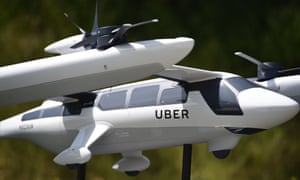Uber
Firm’s first non-US Advanced Technologies Centre will host Elevate programme and research into electric transport

Uber said that the Paris base will allow it to more easily work with European aviation regulators, such as the European Aviation Safety Agency.
Photograph: Robyn Beck/AFP/Getty Images
Uber is opening a new research centre in Paris to develop the firm’s flying taxis as part of its Elevate programme.
The new Advanced Technologies Centre, which will open in the autumn, will be Uber’s first development site outside the US. The taxi firm said that it would be investing €20m (£17.5m) over the next five years and is partnering with École Polytechnique on various research schemes.
“Nearly a decade ago, the idea for Uber was born out of a need to get a ride on a cold night in Paris,” said Eric Allison, head of aviation for Uber. “That’s why we’re excited to announce our new Advanced Technologies Centre in the city where it all began.”
Dara Khosrowshahi, Uber’s chief executive, said: “With world-class engineers and a leading role in global aviation, France is the perfect place to advance our Uber Elevate programme and new technology initiatives.”
The development centre in Paris will join Uber’s Pittsburgh, Toronto and San Francisco sites, and will initially focus on the machine learning and simulation systems needed to manage flying taxis.
Uber said that the Paris base will allow it to more easily work with European aviation regulators, such as the European Aviation Safety Agency. Uber is working with Nasa and others to develop systems that could track, manage and ensure the safety of flying taxis, as well as the regulations that would govern their use.
The company recently gained permission to test drone systems in the US as part of a series of 10 projects green-lit by the Federal Aviation Authority that are designed to explore the technologies and the regulations that would be needed to govern their use.
Uber also said that its Paris research centre would be used to develop smart grids to support future fleets of electric transport on the ground and in the air.
The app-based taxi firm has had multiple set backs in its efforts to develop the next generation of transport vehicles. It recently shut down its self-driving car testing in Arizona, pulling back to Pittsburgh and San Francisco, following the first fatal crash involving an autonomous vehicle.
It also faces stiff competition in the race to develop autonomous flying taxis, including from Google co-founder Larry Page’s Kitty Hawk, which recently unveiled a two-person, 110mph electric drone that was currently going through testing and regulatory approval in New Zealand.
Uber to give drivers and couriers sickness and maternity cover